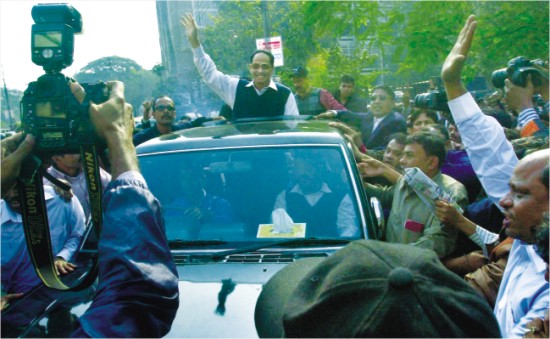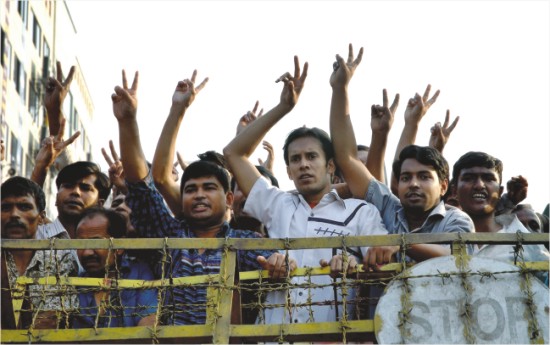
Inside
|
Looking Forward G. M. Quader makes the case for the JP Election for the ninth parliament is almost knocking at the door. All political party activities are with an eye towards the election at the moment. Election manifestos or future programs of political parties have created lots of curiosity and interest, especially among the conscious citizens. At the same time, these are also under critical scrutiny of the people. Here, I present some of the programs that the Jatiya Party pledges to put in place, if it is part of the government after the upcoming elections. The country is passing through an economic condition of price hikes of all commodities including the essentials. This has hit the lower income group very hard, a group which comprises a major section of the population. High food prices, especially of rice, has led to the risk of partial or full starvation in the vulnerable ultra-poor population, people who are unable to work due to different disabilities, and also people who cannot manage full-time employment. The ultra-poor group of the population who are not capable of working would be registered from wards, unions, upazilas, towns, and cities. They would be provided with rice, lentils, edible oils, etc free of cost. The existing 100 days guaranteed work scheme for the jobless workforce would be enhanced to 120 days. The number of beneficiaries would also be enhanced to cover as much landless farm workers as possible, especially in the monga hit northern districts where landless labourers go out of employment seasonally at a definite period of the year. The price of rice would be kept within the purchasing power of poor by open market sale (OMS) at a subsidised price as and when necessary. Lower middle class people would be provided with a package of basic necessities at a subsidised rate through a rationing system. Very high population density and a high rate of population growth is posing a real threat to social order, economic development, and overall good governance by creating an ever-increasing pressure on the scarce resources of the country. All sorts of birth control materials would be distributed free of cost. Couples with one or two issues would be encouraged to go for permanent method of birth control by providing cash incentives. They would also get especial priority in case of employment, other government facilities and even for getting of loan facilities. The unemployment rate is high and rising due to the lack of sufficient job creation compared to the number of fresh youths entering the job market every year. Agriculture, the major job provider, has become saturated and has become the cause for under-employment for a good number of farm labourers. Industrial and economic policies congenial to increased production and creation of new employment opportunities are essential. Establishment of poultry, fisheries and different types of agro-based industries would be encouraged by providing loans at easy terms and cheaper rates. Tax holidays for up to 10 years will be provided if these are installed at under-developed areas like monga prone northern districts.
Special economic zones or industrial parks would be established at district levels with all sorts of infrastructural facilities like electricity, gas, water, road and communications etc. Industries installed at those parks would be allowed special priorities. The above parks would be extended to the upazila level in course of time. All efforts will be provided for the development of the tourism industries which has tremendous potential in the country and due governmental support would be ensured. This sector would be able to provide sufficient job opportunity. Growth of the country is being hampered due to scarcity of energy and also due to inefficient and unreliable supply situation. Coal-based power generation plants will be established using domestic coal. Extraction of coal from the existing fields would be enhanced after finalising a pro-people coal policy. All efforts will be made to implement Rooppur nuclear power plant and, if possible, other nuclear power plants. Rural electrification would be expanded to cover the entire country with sufficient supply of electrical power. Gas pipeline network will be expanded to cover the northern part of the country specially for providing CNG to vehicles. Exploration for new gas fields would be strengthened. Education, health, sports and the environment are other vital sectors which need utmost attention to make the nation prepared knowledge-wise and equipped with the proper physical and environmental condition to face the global challenge ahead. All education up to HSC level will be made free for both male and female students. At least one technical college would be established in every district. Salary and other benefits of all the registered primary educational institutions will be made equal to government-run primary schools. One cadet college type institution will be established at all the districts. One women cadet college will be established in each of the divisional cities including one at Pairabandh, Rangpur, the birthplace of Begum Rokeya, pioneer of female education in this part of the world. The health policy declared by JP in the month of July 1990, when the party was in power will be re-introduced after necessary modifications. Every union will have one health and family welfare centre with a full time doctor. All doctors getting a degree from government medical colleges will need to work for at least two years in a union medical centre before being allowed to go for any further higher education. Every district will have at least one nurse training institute. At least one cricket stadium would be made in each district town within five years. Initiatives will be taken to ensure suitable playgrounds at all educational institutions of the country, private or public. It will be made compulsory in future to have playgrounds at every educational institution to obtain governmental approval. Steps would be taken for promotion of sports and culture in the country. A very extensive forestation program will be taken up through-out the entire country. Anti-pollution acts would be implemented with proper seriousness. Measures for excavation and saving of rivers like Buriganga and Kopatakkha from pollution will be taken. Agriculture had been all along the backbone of our real economy. It is a big advantage that the country is in a position to produce almost all the food we need, even under very adverse climatic and disaster-prone situations. It is a matter of regret that the peasants had never been given the due recognition and had always been deprived of proper state patronage. All sorts of agricultural inputs will be made available in a way that the peasants get these without any hassle and at a reasonable price. Just price of the agro-products will be ensured. A retail market for agricultural products would be set up at suitable places just outside every district town wherever necessary. Sufficient quantities of rice and paddy will be procured by government at a reasonable price to ensure due worth of produce for the growers. This will also ensure enough stock of food with the government for implementation of humanitarian programs as described above. Land reform programs will be chalked out and implemented in a way that government owned khas lands are distributed to the real landless peasants. Development of infrastructural facilities and improvement of road communication are an important component for overall growth and for enhancement of quality of life.
To reduce traffic jams and ensure smooth and comfortable transportation inside Dhaka city, new flyovers and roads will be built at different points. Initiatives would be taken to establish a sky train or underground rail. Bridges will be newly built and the ones under construction ones over Padma and Tista at different places will be completed quickly. Parallel roads will be built along with inter-district highways for slower vehicles like rickshaw van, etc. In addition, a JP government would begin construction of a deep sea port at Kutubdia. The remaining portion of greater Dhaka protection embankment will be completed. The drainage system of Dhaka city will be improved for getting rid of frequent water logging. Women and children are the vulnerable section of the population. They are subjected to discrimination and inhuman behavior every now and then. Measures are to be taken for proper protection of women and children and ensure their due rights. At least 33% positions in JP and also in the government will be filled by women within the next 10 years. Measures will be taken for creating awareness against sexual harassment at work places and educational institutions. All international treaties to safeguard child rights will be implemented. Establishment of child care units will be made compulsory in institutions where women make up more than half of the workforce. Poor female students will be allowed to continue higher studies for free. For better governance, strengthening of local government is a necessity and decentralisation of government structure makes it easier. JP proposes to introduce federal system of government in place of present unitary form by dividing the country into eight provinces. Every province will have a provincial council and a provincial government in addition to the central federal government with a national parliament. JP proposes a radical reform in national election process by introducing procurement of parliament seats on the basis of total votes received throughout the country by the party and its proportion to the total votes cast. A list of party candidates will be declared earlier on priority basis and candidates are selected from that list as per the above proportion to fill all the 300 seats of the parliament.
JP will re-introduce the upazila system with courts as when it was first introduced during its rule. JP will introduce the post of two vice-chairmen in union parishads with the provision of one woman vice-chairperson. JP will propose to use the armed forces as a well organised, efficient, and capable institution in the development process during normal peace time. Housing facilities will be organised for the retired armed forces people at different district levels. In order to improve law and order, the police force will be strengthened with enhancement of number and by providing better equipment and improved training facilities. Housing facilities would be enhanced for the police force. Imams and moazzams of one selected mosque in every ward of a union will be provided with reasonable monthly remuneration from the government. For ensuring a democratic environment, freedom of the press and mass media, the right to information, etc are pre-requisite conditions. JP will ensure the freedom of press and media and proper and effective implementation of the Right To Information Act. JP will also take initiative for implementation of e-governance. JP has served the country in the past and has a record of fulfilling the commitments given to the people. It is hoped that the people will consider the programs from that point of view and will provide support if it is felt suitable so that JP can continue with its proposed welfare activities.
G. M. Quader is a Jatiya Party presidium member and former Member of Parliament. |


